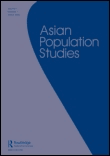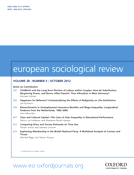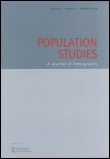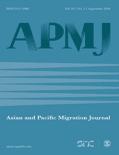
POPULATION
Scope & Guideline
Connecting Research with Real-World Demographic Challenges
Introduction
Aims and Scopes
- Demographic Dynamics and Development:
The journal emphasizes the interrelationship between demographic changes and developmental processes, exploring how population factors influence socio-economic growth, resource allocation, and policy-making. - Migration and Mobility:
Research often focuses on migration patterns, including the socio-economic impacts of migration and the relationship between climate change and migration, as seen in studies comparing different geographical contexts. - Family Structures and Parental Dynamics:
The journal investigates family configurations, including step-parenthood, parental separation, and the socio-cultural factors influencing family dynamics, with a focus on contemporary societal changes. - Health and Well-being:
Health-related studies address population health issues, reproductive health politics, and the impacts of socio-economic factors on well-being, especially during crises like the COVID-19 pandemic. - Gender and Social Issues:
The journal explores gender dynamics, including gender-based violence and the roles of gender in family and societal structures, contributing to discussions on equality and social justice. - Educational Inequalities:
Research highlights disparities in educational outcomes across different populations, particularly focusing on how socio-economic status and geographic location affect access to education.
Trending and Emerging
- Impact of Climate Change on Migration:
Studies increasingly focus on the intersection of climate change and migration, exploring how environmental factors drive demographic shifts and influence migration patterns, particularly in vulnerable regions. - Well-being in the Context of Remote Work:
Research examining the implications of teleworking on well-being has surged, particularly in light of the COVID-19 pandemic, highlighting the need for understanding work-life balance in a changing labor market. - Gender Dynamics in Family and Society:
There is a noticeable increase in research addressing gender issues, particularly related to family dynamics and societal roles, reflecting heightened awareness of gender-based challenges post-#MeToo. - Use of Advanced Methodologies:
Emerging themes include the application of innovative methodologies, such as the use of satellite imagery for census data, showcasing the journal's commitment to embracing new technologies for demographic research. - Reproductive Health Politics:
There is a growing examination of reproductive health issues within global politics, particularly in relation to post-abortion care and its implications for public health policy, reflecting a trend towards critical analysis of health systems.
Declining or Waning
- Historical Demographic Studies:
Fewer studies appear to focus on historical demographic analyses, such as those examining demographic shifts in the late 19th century, suggesting a move towards contemporary issues. - Traditional Family Structures:
Research on traditional family structures, particularly those that do not account for modern variations in family dynamics, seems to be less prevalent, indicating a shift towards more complex family models. - Static Population Models:
There is a decline in studies utilizing static models to analyze population data, with a growing preference for dynamic, longitudinal approaches that better capture changing demographic trends.
Similar Journals

POPULATION AND ENVIRONMENT
Pioneering Research on Population and Environmental InteractionsPopulation and Environment is a renowned journal published by Springer, focusing on the critical intersection between demographic processes and environmental changes. Established in 1980, the journal has become a leading platform for interdisciplinary research, with its impressive impact reflected in its 2023 rankings, placing it in the Q1 quartile for both Demography and Environmental Science (miscellaneous) categories. With Scopus Ranks highlighting its prominent position (#11 out of 139 in Social Sciences – Demography, and #46 out of 219 in Environmental Science), Population and Environment fosters a rich dialogue among researchers, professionals, and students dedicated to understanding how population dynamics influence environmental conditions and vice versa. Operating without an open access option, the journal ensures high standards for scholarly contributions and remains committed to bridging knowledge gaps in the realms of population studies and environmental science. The journal's rigorous peer-review process and comprehensive archive from 1980 to 2024 solidify its reputation as an invaluable resource for advancing research and informing policy in these critical fields.

Novedades en Poblacion
Empowering Scholars to Transform Population PolicyNovedades en Poblacion is a pivotal academic journal dedicated to the interdisciplinary exploration of demographic studies, population policies, and social dynamics, published by UNIV HABANA. Since its inception in 2005, this open access journal has provided a platform for researchers, professionals, and students to disseminate and discuss cutting-edge research and findings relevant to populations in Latin America and beyond. With a commitment to high-quality scholarship, Novedades en Poblacion plays a vital role in contributing to the global conversation on demographic changes, migration patterns, and socio-economic impacts on populations. Researchers are encouraged to submit original articles, reviews, and studies that advance the understanding of demographic issues, making it an essential resource for those engaged in the fields of sociology, public health, and urban studies.

JOURNAL OF POPULATION RESEARCH
Unveiling trends that shape our societies.JOURNAL OF POPULATION RESEARCH, published by Springer, is a premier journal dedicated to advancing the field of demographic studies. With a focus on research that addresses the complexities of population dynamics, this journal serves as a vital platform for scholars, practitioners, and students alike. It holds a commendable Q2 ranking in the Demography category for 2023, underscoring its influence and commitment to quality research. The journal spans a rich convergence of knowledge from 2005 to 2024, covering key developments and emerging trends in population research. Although it operates under a traditional access model, its impact continues to resonate throughout the academic community, highlighting the importance of robust demographic analysis in policy and planning. By fostering insightful discussions and providing access to groundbreaking studies, the JOURNAL OF POPULATION RESEARCH remains an essential resource for those eager to deepen their understanding of population issues.

Population Review
Advancing Understanding in Demographic TrendsPopulation Review, published by Sociological Demography Press, is a vital resource in the field of demography, contributing to the understanding of population dynamics and trends since its inception in 1988. With an ISSN of 1549-0955 and an E-ISSN of the same number, the journal has played a significant role in disseminating scholarly research and analysis relevant to demographic changes and their implications. Although currently categorized in the Q4 quartile, it ranks 78th out of 139 in the Scopus Social Sciences: Demography category, placing it within the 44th percentile among its peers. This journal serves as a platform for researchers, professionals, and students to engage with contemporary population issues, encouraging the exploration of new theories and methodologies. While not available as open access, its robust editorial standards and commitment to rigorous research make it an invaluable addition to the libraries of demographers and social scientists alike.

Asian Population Studies
Exploring the Dynamics of Asia's PopulationsAsian Population Studies is a distinguished journal published by Routledge Journals, Taylor & Francis Ltd, delivering comprehensive insights into the vibrant field of demography. Since its inception in 2006, this peer-reviewed journal has consistently provided a platform for high-quality research that enhances our understanding of population dynamics in Asia. With an impressive category ranking of Q2 in Demography for 2023, and holding a notable position as 35th out of 139 within the Scopus ranking, it is recognized for its significant contributions to the field, appealing to researchers, scholars, and professionals alike. The journal covers a diverse range of topics, including population growth, migration patterns, and socio-economic factors influencing demographic changes across Asian countries. Although it does not offer open access, Asian Population Studies remains a vital resource for those seeking to explore demographic trends and their implications for policy and practice in one of the most populous regions of the world. With a commitment to academic excellence, it continues to serve as an essential tool for anyone engaged in demographic research and study.

Chinese Journal of Population Resources and Environment
Advancing Knowledge at the Intersection of Population and EnvironmentChinese Journal of Population Resources and Environment is an esteemed interdisciplinary journal published by KEAI PUBLISHING LTD, focusing on the critical intersections of population dynamics, resource management, and environmental sustainability. With an E-ISSN of 2325-4262 and an ISSN of 2096-9589, this Open Access journal has been committed to disseminating high-quality research since its inception in 1992 and has embraced Open Access since 2020. As part of its robust reputation, the journal ranks in the Q1 category for Demography and is recognized in the Q2 tiers for both Environmental Science and Toxicology, reflecting its significant contribution to these fields. The 2023 Scopus rankings highlight its competitiveness, with an impressive percentile of 84th in Demography and 67th in Environmental Science (miscellaneous). Hosted from Beijing, China, the journal serves as a vital platform for researchers, professionals, and students to engage with cutting-edge studies that address pressing global challenges related to population and environmental resources.

EUROPEAN SOCIOLOGICAL REVIEW
Exploring the depths of social dynamics and theory.European Sociological Review, published by Oxford University Press, stands as a leading journal in the fields of sociology and political science. With an impressive h-index and a 2023 ranking in the top 10th percentile (Q1) of Scopus, it represents a key platform for scholars and practitioners seeking to advance sociological discourse. Since its inception in 1985 and continuing through to 2024, this journal has provided a wide array of high-quality articles that explore various dimensions of sociological theory, research, and application, fostering a deeper understanding of social dynamics. Although not open access, the journal's rigorous peer-review process ensures that only the most impactful research is disseminated, making it an essential resource for academia, policy-making, and social research. By focusing on contemporary sociological challenges and contributing to significant debates, the European Sociological Review is invaluable for researchers, professionals, and students committed to the empirical understanding of societal trends.

Papeles de Poblacion
Empowering knowledge sharing in the field of demography.Papeles de Población, published by the Universidad Autónoma del Estado de México, is a prominent open-access journal that has been advancing the field of demography since its inception in 1997. With an ISSN of 1405-7425, this journal aims to foster a deeper understanding of population studies through research articles, reviews, and critical analyses that address the complex dynamics of demographic changes, social structures, and their implications. While currently ranked in the fourth quartile of its category in 2023, it serves as a significant channel for researchers, professionals, and students to disseminate and access cutting-edge findings. Open access since 2004, it provides a platform for broader readership and knowledge sharing, thus contributing to the global discourse on population issues. Based in Mexico, the journal is committed to embracing diverse perspectives, emphasizing the importance of regional studies within a global context.

POPULATION STUDIES-A JOURNAL OF DEMOGRAPHY
Navigating the Intersections of Population Studies and HistoryPopulation Studies: A Journal of Demography is an esteemed scholarly publication dedicated to advancing the understanding of demographic trends and their historical contexts. Published by Routledge Journals, Taylor & Francis Ltd, this journal has a notable impact in its field, recognized as a Q1 category journal in both Demography and History as of 2023. Its Scopus rankings highlight its significance, featuring a remarkable 12th place rank in Arts and Humanities—History and 19th place in Social Sciences—Demography, both underscoring its influential role in academic research. Established in 1947, the journal has consistently contributed to the discourse in population studies, offering a platform for innovative research and critical analysis. While it does not provide open access options, it remains a vital resource for researchers, professionals, and students who seek to explore the complex relationships between population dynamics and historical narratives. Its comprehensive coverage from 1947 to 2024 ensures a rich repository of knowledge, making it essential for anyone involved in demographic research.

Asian and Pacific Migration Journal
Decoding migration trends through rigorous scholarship.The Asian and Pacific Migration Journal is a premier scholarly publication dedicated to the critical examination of migration issues within the Asian and Pacific regions. Published by SAGE PUBLICATIONS LTD, this journal has played a pivotal role in advancing knowledge and understanding in the fields of demography and geography, evidenced by its recognition in the 2023 Category Quartiles as Q2 in Demography and Q3 in Geography, Planning and Development. Since its inception in 1992, the journal has sustained a commitment to providing high-quality, peer-reviewed articles that engage with contemporary migration challenges and trends, making it essential reading for researchers, professionals, and students alike. Although not open access, the journal continues to maintain a respectable Scopus rank in the social sciences, making significant contributions to academic discourse. As it moves towards 2024, the journal remains a vital resource for those seeking to deepen their understanding of migration dynamics in these critical regions.